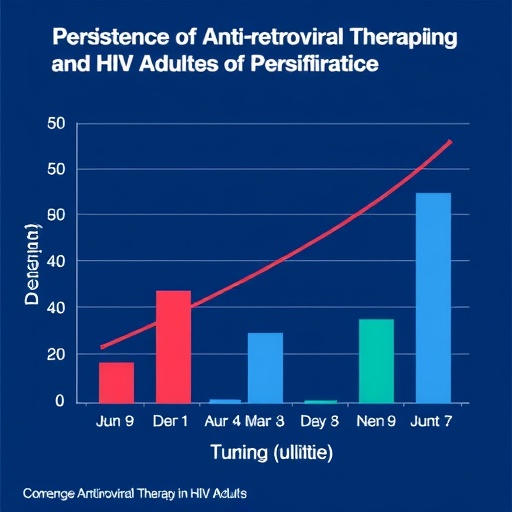In recent years, the intersection of mental health disorders and substance use disorders (SUD) in individuals living with HIV has garnered significant attention from healthcare professionals and researchers alike. A groundbreaking study led by Kong, A.M. and colleagues investigates how real-world persistence is affected in adults diagnosed with HIV, particularly those who also grapple with mental health or substance use issues after resuming antiretroviral therapy (ART) in the United States. This research aims to shed light on the challenges these populations face and the factors influencing adherence to vital treatment regimens.
The impetus for this research stems from the understanding that HIV, once considered a death sentence, is now manageable, thanks to advancements in antiretroviral medications. Nonetheless, the successful treatment of HIV is not solely reliant on the efficacy of these medications; adherence to prescribed therapies remains critical. The study takes into account the multifaceted nuances faced by patients who concurrently struggle with both mental health and substance use disorders, conditions that significantly complicate HIV treatment adherence.
One of the key observations highlighted in this study is the gravity of mental health issues among HIV-positive individuals. Mental health disorders are not uncommon among this group, with conditions such as depression and anxiety frequently reported. When mental health deteriorates, the likelihood of adhering to ART diminishes. This creates a vicious cycle where HIV-related health deteriorates further due to non-adherence, which can subsequently exacerbate mental health challenges. The study explores these dynamics, emphasizing the necessity of comprehensive treatment approaches that address mental health in conjunction with HIV care.
Substance use disorder is another critical element that compounds the challenges faced by individuals with HIV. The study underscores that the use of substances often interferes with a person’s capacity to maintain regular healthcare appointments, including adherence to ART. Substance use can lead to erratic behavior, impaired judgment, and lifestyle choices that detrimentally affect health outcomes. By providing statistics and real-world examples, the authors highlight the urgency of addressing substance use concurrently with HIV treatment for better outcomes.
Interestingly, the study posits that there is a notable persistence in treatment when specific supportive structures are in place. The researchers examined various support systems, including peer support groups, counseling services, and access to mental health professionals. These systems proved essential in promoting adherence among individuals who have both HIV and either mental health or substance use disorders.
Another significant finding from this research is related to the socio-economic factors affecting adherence rates. Many individuals living with HIV are also facing socio-economic challenges that could hinder their healthcare efforts. Access to healthcare resources is often limited by financial constraints, transportation issues, and inadequate social support. The research illuminates how these socio-economic stressors can contribute to lapses in ART adherence, calling for a more integrated approach to care that considers these barriers.
Moreover, the study delves into the role of healthcare provider awareness and training in managing patients with co-existing conditions. It emphasizes that healthcare professionals must be equipped with specialized knowledge and tools necessary to support patients holistically. The authors advocate for increased training in understanding the complexities of concurrent mental health and substance use challenges in HIV care.
The findings of this research have significant implications for public health policies. They underscore a pressing need for healthcare systems to adapt and incorporate mental health and substance abuse treatment into standard HIV care protocols. Without addressing these intertwined issues, the risk of treatment non-adherence remains substantial, highlighting a gap in the healthcare provisioning that could otherwise lead to improved outcomes for those affected.
Ultimately, the research conducted by Kong et al. paves the way for a paradigm shift in how HIV treatment is approached, particularly in populations with additional mental health or substance use challenges. The concept of integrated healthcare is emphasized as essential for the future of HIV treatment, advocating for a comprehensive approach that encompasses medical, psychological, and social support aspects.
In conclusion, the importance of addressing both mental health and substance use in the context of HIV treatment cannot be overstated. As this study illustrates, neglecting these critical factors can lead to poorer health outcomes, reinforcing the necessity for an integrated approach to care that prioritizes the whole patient. Moving forward, the insights from this research should inform both clinical practices and healthcare policies to foster environments where individuals with HIV can thrive holistically.
As the research landscape continues to evolve, it is imperative for further investigation into effective interventions and support strategies tailored to the unique needs of adults with HIV suffering from mental health and substance use disorders. Only through a concerted effort can we hope to enhance treatment adherence and ultimately improve the quality of life for those affected by these intersecting challenges.
Subject of Research: Real-world persistence in adults with HIV and mental health or substance use disorders after restarting antiretroviral therapy.
Article Title: Real-World Persistence in Adults with HIV and Mental Health or Substance Use Disorders After Restarting Antiretroviral Therapy in the United States.
Article References:
Kong, A.M., Lucia, J., Christoph, M.J. et al. Real-World Persistence in Adults with HIV and Mental Health or Substance Use Disorders After Restarting Antiretroviral Therapy in the United States. Adv Ther (2025). https://doi.org/10.1007/s12325-025-03379-1
Image Credits: AI Generated
DOI: 10.1007/s12325-025-03379-1
Keywords: HIV, Antiretroviral Therapy, Mental Health, Substance Use Disorders, Treatment Adherence, Real-World Evidence
Tags: antiretroviral therapy persistencefactors influencing HIV medication adherencehealthcare strategies for HIV patientsHIV treatment adherence challengesimpact of mental health on HIV therapymanaging HIV with co-occurring disordersmental health and substance use in HIVmental health disorders in HIVovercoming barriers to HIV treatmentreal-world HIV treatment outcomessignificance of adherence to antiretroviral therapysubstance use disorders in HIV patients





